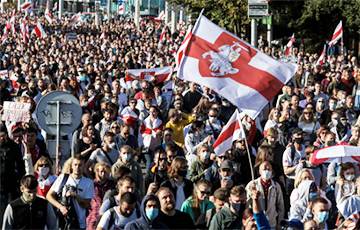Lukashenka's Regime Is Doomed
51- Andrei Zubau
- 21.09.2020, 10:50
- 118,460

PHOTO: TASS
Historians will study what is happening in Belarus for quite a long time.
Yes, before Belarus, there have been revolutions of the Arab Spring, very similar to it, then the Armenian Revolution of 2018, which was almost similar to it. But it is the Belarusian Revolution gives an example of a pure type of rebellion of the masses of cultural people against a rigid authoritarian dictatorship in the Internet age.
The era of the Internet is the key point here. It is the Internet that allows people to self-organize without charismatic leaders, without possessing mail and telegraphs, tele-centers and newspaper printers. All this alphabet of revolution of XIX-XX centuries has now become a goner. And the intervention of the revolutionary troops, as was the case on Senate Square or during the First Polish Uprising, or even in 1905-1917, is no longer needed.
Previously, a revolutionary force against power at best with the sympathy of the people, and sometimes without it (the October coup of 1917) - their indifference is enough. Now, the majority of the people - unarmed and ready to protest non-violently. Previously, there were no means to mobilize such protest. Now there is such a resource - horizontal communication of the Internet. The revolution in Belarus is being made by Telegram. The necessary condition for such a new type of revolution is the strong indignation of all the people against the authorities, who have lost their popularity and do not want to leave while the going is good.
If a significant part of the people is satisfied with the power, the new type of revolution cannot take place. The power will mobilize its supporters in the same ways. Therefore, the power of a confessional, tribal or ethnic minority over the majority has a large margin of safety. But when the power claims to represent the whole society, it becomes extremely vulnerable. The whole society can easily organize itself against "its" power if it ceases to consider it its true power. And this is exactly what happens in Belarus now.
The dictator has violated the Constitution, has been ruling for 26 years already, the people are tired and do not feel happy in comparison with the neighboring nations of Poland, Lithuania and Latvia. Then again, the Internet, even without traveling, makes these neighboring countries well known, and there are also strong cross-border connections. It seems that the dictator has power structures on his side. But they are the same Belarusians who use the same Internet and live among other Belarusians. Any anonymity that used to exist when troops were moved from one district to another is now impossible, especially in a small country.
In response to the atrocities, they start publishing all the personal data of the police on the Internet. And let them then prove to their neighbors and their children, to their schoolmates that they did not round up and beat up anybody personally... Such moral pressure in a homogeneous society quickly becomes unbearable in the Internet age.
Certainly, there are people personally devoted to the dictator - some of them for money, some of them hoping for power. But there are always few of them under a tyrannical regime. And these people are easily swept away by mass protest if the power structures are demoralized.
Revolutions of a new type do not happen in one day and night. Moral pressure increases gradually. Intimidation, terror of power, very effective in a divided society of people-potatoes in a sack, has absolutely no luck in a society united by the Internet, where cruelties lead not to fear, but to people's hardening and consolidation.
Peaceful mass resistance has a huge power potential. Even if the dictator has not the nerves, but the iron ropes, not the conscience, but the animal instinct of power at any cost, then after a while he discovers that he has almost no one to rely on, and even his closest associates are already looking for someone to replace him in order to survive themselves facing the rebellious citizens.
Obviously, citizens may get tired of going to the rally every Sunday, but even staying at home they do not stop hating the tyrant and do not become more loyal to him. And the active minority continues to go out and disseminate more and more perforating facts on the Internet. And the abscess ripens again.
And at some new acute moment, a city where at best there used to be a hundred thousand people in the streets, is now filled with a million indignant citizens. And such a peaceful protest will win irrevocably.
In today's world, in a developed homogeneous country, a regime that relies only on lies, strength and cruelty, is doomed. Lukashenka's regime is doomed, in the near future both Putin and Nazarbayev's regime are doomed. Today, when Putin has given Lukashenka a billion dollars, and he continues to beat up his citizens, Putin has become an accomplice to the politically dying Belarusian tyrant. And this significantly accelerates the fall of both.
The world-historical significance of the Belarusian Revolution is the topic of future doctoral dissertations. Based on its experience, nations in many countries will learn to liberate themselves from tyrants without spilling much blood, relying not on military conspiracy but on modern technologies. And the rulers themselves, prone to tyranny, will understand that the old chieftain regimes are not for them, it is history, which in new circumstances will not be reproduced, except for a short time and as a farce, albeit with brutal overtones.
Both we, common citizens, and they, who love to hold sway for a while, must get used to living in a society where everyone knows everything about everyone and can easily establish contacts and agreements without resorting to the services of the authorities.
These are the new circumstances of the future, which already begins in the streets of Belarusian cities.
Andrei Zubau, Facebook









